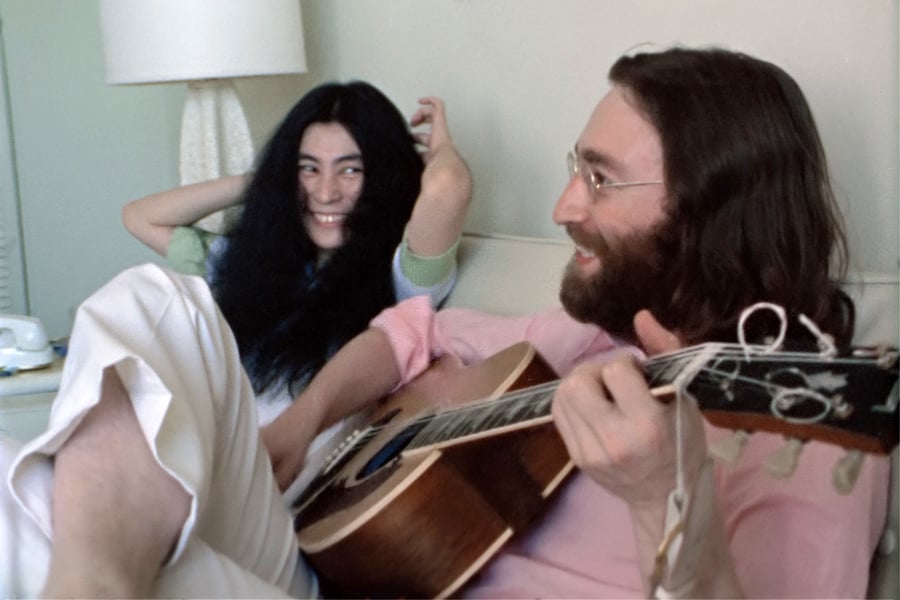Rarely has an artist had such an extraordinary life, and been the target of so much vitriol, as Yoko Ono.
Ono is loved, misunderstood, and unnecessarily vilified – a spitball of racism, misogyny and ignorance. If a statue of Ono was erected, some fool would knock it down the next day.
John Lennon’s muse, collaborator and widow has, since the Beatles officially called it a day in 1970, been named and shamed as the woman who split up the Beatles. A nonsense, of course, considering it was Mark Chapman who ensured the Beatles would never reunite by spraying five bullets into Lennon’s back outside The Dakota building on a cold December night in 1980.
Ono was a witness then, as she was when the Beatles made so much history.
Now aged 92, the Japan-born multimedia artist, singer-songwriter, and peace activist has appeared fragile in recent years. And, thankfully, the public scorn has weakened.
David Sheff has something to do with that.
The acclaimed American author has helped correct the record on Ono, through his numerous accounts of time spent with the pair, including All We Are Saying: The Last Major Interview with John Lennon and Yoko Ono, and his new book, Yoko, published by Simon & Schuster.
Love Music?
Get your daily dose of everything happening in Australian/New Zealand music and globally.
Sheff, whose works have been published in The New York Times, Outside, Rolling Stone, WIRED and Fortune, landed the assignment of a lifetime when, aged 24, he spent three weeks with John and Yoko. “I didn’t quite understand what I was in for. They really opened up their lives,” he recounts in a Zoom with Rolling Stone AU/NZ from his home in Inverness, California, a 90-minute drive north of San Francisco.
“Part of it was the timing – they had not done interviews for about five years and hadn’t made records for a period of time.” Lennon had emerged from his self-described “lost weekend,” when, following his separation from Ono in 1973, he began a relationship with music executive May Pang that lasted more than 18 months. John and Yoko were in love, again. “When I met them, they had decided to go back in the recording studios and make the album and ended up being called Double Fantasy. I walked in without knowing what to expect. I was excited but I didn’t know what a big deal it was.”
John and Yoko “were about the biggest stars in the world. And it wasn’t just that; they were so incredibly open and never went off the record in talking about the most personal details of the lives, everything from the breakup to their experiences with drugs, to the lost weekend.”
Sheff shadowed the famous pair as they enjoyed an isolated, quiet life. Just a few months later, Lennon was killed. “Yoko really didn’t have a lot of people in her life. And because we shared that very intimate time together, she invited me into her life in a way that maybe she wouldn’t have otherwise.”
Yoko, says Sheff, has a comic touch that’s often overlooked (she made a film starring bottoms and nothing else). And she remains a controversial figure within the Beatles’ fan community, and outside it. “The one place where she’s been accepted and celebrated is in the art world,” he explains. “Because over the last 20 years, there have been retrospectives of her art that really show her as the innovative pioneer that she has been. People in the art world that I speak to really talk of Yoko with reverence.”
Has Yoko read the book? “I heard from Sean, not from Yoko, who said he could barely get through it because it was so emotional for him. It’s history and kind of entertainment for us, for him it’s his life,” notes Sheff. “And it doesn’t just show the fun stuff. It shows some of the hard stuff that she went through and that he went through growing up. He said he felt it really was a celebration of his mom and he couldn’t have asked for more than that. That was really meaningful to me.”
Sheff also heard from Yoko’s daughter, Kyoko Ono Cox, who said the book was “very validating to her, too. Because her story hasn’t really been told. And finally, because she was so open with me when I conducted interviews with her, she’s a prominent part of the book.”
Conversation inevitably swerves to politics and the bizarre daily stories emerging from the MAGA administration. When Donald Trump was elected the first time, in 2016, Ono responded like many of us, with a tweet. Hers, however, carried an otherworldly scream. Comedy, art, politics – all smashed together.
“Her voice and her message seems even more important now that it has ever,” says Sheff. “We should remember her as a pioneer who really changed art and music and who devoted her life to something that she was criticised for and called naive form, which was a belief that if we can imagine a better world, we can actually get one. She really, really believed it. And she lived it.”
“Yoko” by David Sheff is now available through Simon & Schuster.



































